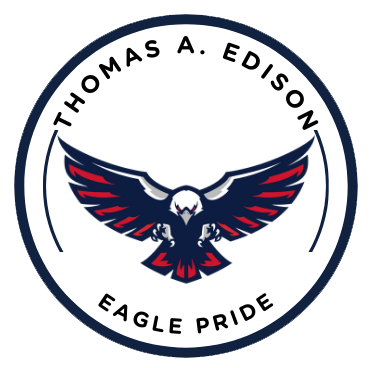Honesty Policy
Fairfax County Schools and Thomas A. Edison High School encourage students to demonstrate the ability to work interdependently within groups to increase productivity and achieve common goals. Students should act responsibly and ethically. To develop academic honesty in all students, FCPS views cheating and plagiarizing as unacceptable behaviors that have moral and legal implications. Cheating is violating established rules and codes of ethics. Plagiarizing is falsely claiming authorship. Cheating and plagiarizing are serious offenses.
I. Guidelines
A. Teachers have the responsibility to:
- Teach or review the correct use of sources and citations when assigning work.
- Structure conditions during testing to alleviate the possibility of cheating.
- Specify the types of collaboration that are discouraged and those that are encouraged.
B. Students have the responsibility to:
- Avoid situations that might contribute to cheating or plagiarizing.
- Avoid unauthorized assistance.
- Use sources in the prescribed manner.
- Document borrowed materials by citing sources.
- Avoid plagiarism by using quotation marks for statements taken from others, by acknowledging information and ideas borrowed from any source, and by consulting faculty members about questionable situations.
- Avoid "cutting" and "pasting" from computer text without proper attribution.
II. Implications
Students who violate “the spirit or the letter of the law” as regards cheating and plagiarizing must accept responsibility for their actions and the accompanying consequences. Consequences may include:
- A parent-student-administrator conference.
- A lowering of the grade or receiving an F for the assignment.
- An alternative assignment or recompletion of the original assignment.
Rights of the student and consequences
Students Rights:
- A student has the right to seek counsel about aspects of academic dishonesty from a teacher, counselor, or administrator.
- A student has the right to receive credit/recognition for their own work.
- A student has the right to be in an environment free from collusion or behaviors that provide students unfair advantages over others.
- A student has the right to learn in a safe environment without fear that others have an unfair advantage.
- A student may ask for clarification when learning aids (web, cellphone, outlines, notes, etc.) can be used.
Student Consequences:
1st Offense:
- Parental notification.
- Teachers will conference with student about academic dishonesty.
- Student will redo the assignment/assessment. The teacher will follow the guidelines in the class syllabus when awarding a grade to the assignment.
- Student will accept responsibility in a letter of apology to the teacher.
- Student will receive a discipline referral for documentation.
2nd Offense:
- Parental notification.
- Student will receive a 0% on the assignment/assessment on which he/she cheated.
- Student will accept responsibility in letter of apology to the teacher.
- Student will meet with an administrator and sign a behavioral contract, effective for the remainder of the school year, which outlines the next level of consequences should the student violate the Honor Code a third time.
- Full IB Candidates will meet with the IB coordinator for further counseling about remaining in IB should there be additional Honor Code violations.
- Student will be removed from any honor societies and/or class office for the remainder of the school year.
- Student will receive a discipline referral for Administrative Detention.
3rd Offense:
- Parental notification.
- Student will receive a 0% on the assignment/assessment on which he/she cheated.
- Student will accept responsibility in a letter of apology to the teacher.
- Student will receive a discipline referral; serve a one day in-house suspension for cheating and for failing to comply with the behavioral contract.
- Full IB candidates may be removed from the IB Programme.
Further consequences for each offense will be determined in a case-by-case manner by the administrator – dependent on the disruption to the academic process and the student’s needs and history of academic honesty violations. The goal in every situation is to ensure that the student is learning from his/her mistakes in an effort to maintain an environment that fosters growth, academic integrity, and the characteristics of the IB Learner Profile.

